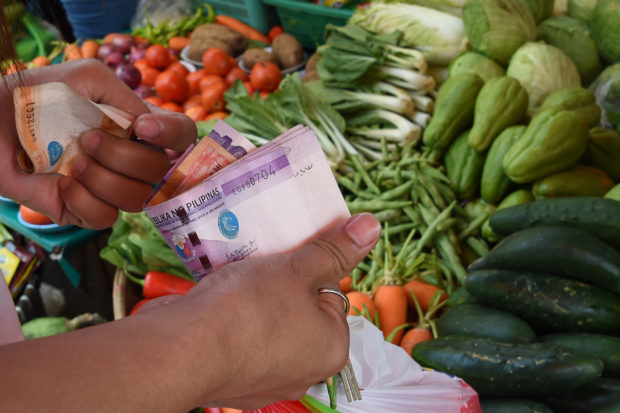The central bank expects the rate of increase in the prices of basic goods and services to have slowed down slightly in May as some food items became more affordable during the period, offsetting an increase in fuel prices caused by rising global demand.
In a statement, Bangko Sentral ng Pilipinas (BSP) Governor Benjamin Diokno said the agency’s economists project the inflation rate for last month to settle within the range of 4 to 4.8 percent, with a median of 4.4 percent.
The BSP’s forecast is a touch lower than the 4.5-percent inflation rate announced by the government for May, and lower than the regulator’s forecast for last month of 4.2 to 5 percent.
“Higher prices of meat and domestic petroleum products along with the upward adjustment in Meralco electricity rates are the main sources of upward price pressures for the month,” Diokno said.
“These could be offset by the decline in prices of key food items, such as rice, vegetables, and fish, due to improved supply conditions, along with the appreciation of the peso,” he added.
The Philippine Statistics Authority is scheduled to release the inflation rate for May on June 4, Friday.
Markets are closely monitoring the country’s inflation rate, which spiked in recent months mainly due to a pork shortage caused by an African swine fever outbreak that decimated the local hog industry.
So far, the central bank has refrained from tightening monetary policy in response to the inflation spike, saying rising prices are caused by supply side problems, which cannot be addressed by raising interest rates.
Instead, the regulator has called on government to alleviate the tight supply situation by raising the country’s quota for pork imports.
“Moving forward, the BSP will remain watchful of economic and financial developments to ensure that the monetary policy stance remains consistent with the BSP’s price stability mandate,” Diokno said.
Diokno earlier said the policy making Monetary Board believes that the prevailing inflation rate regime “is consistent with expectations that inflation would remain elevated this year” owing to supply-side pressures, before settling close to the midpoint of the target range next year.
He said “the balance of risks to the inflation outlook remains balanced around the baseline path in 2021, while leaning toward the downside in 2022.”
To bring down pork prices, President Duterte slashed tariffs and hiked the minimum access volume quota to augment domestic supply with more imports amid the African swine fever crisis. INQ
